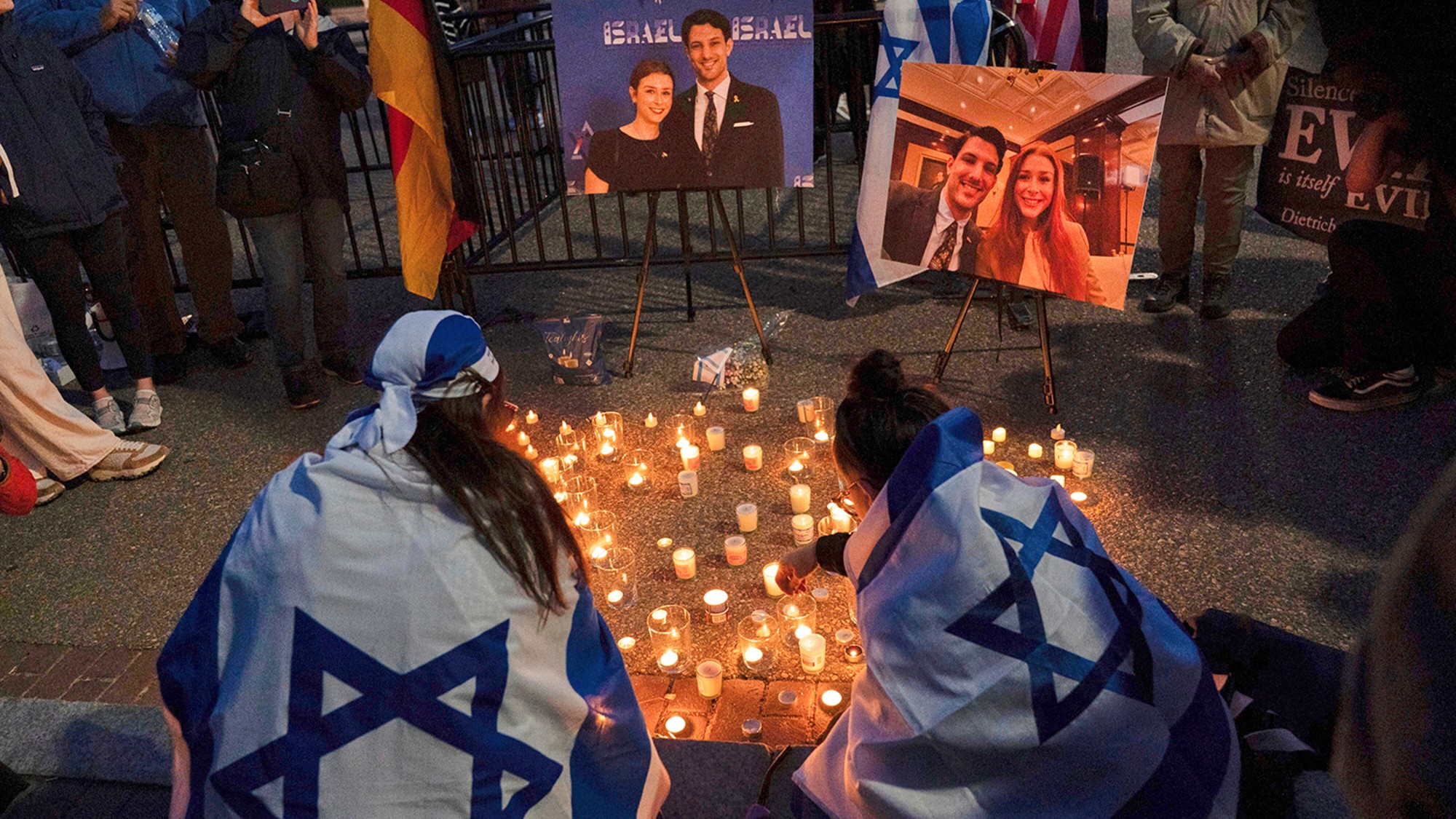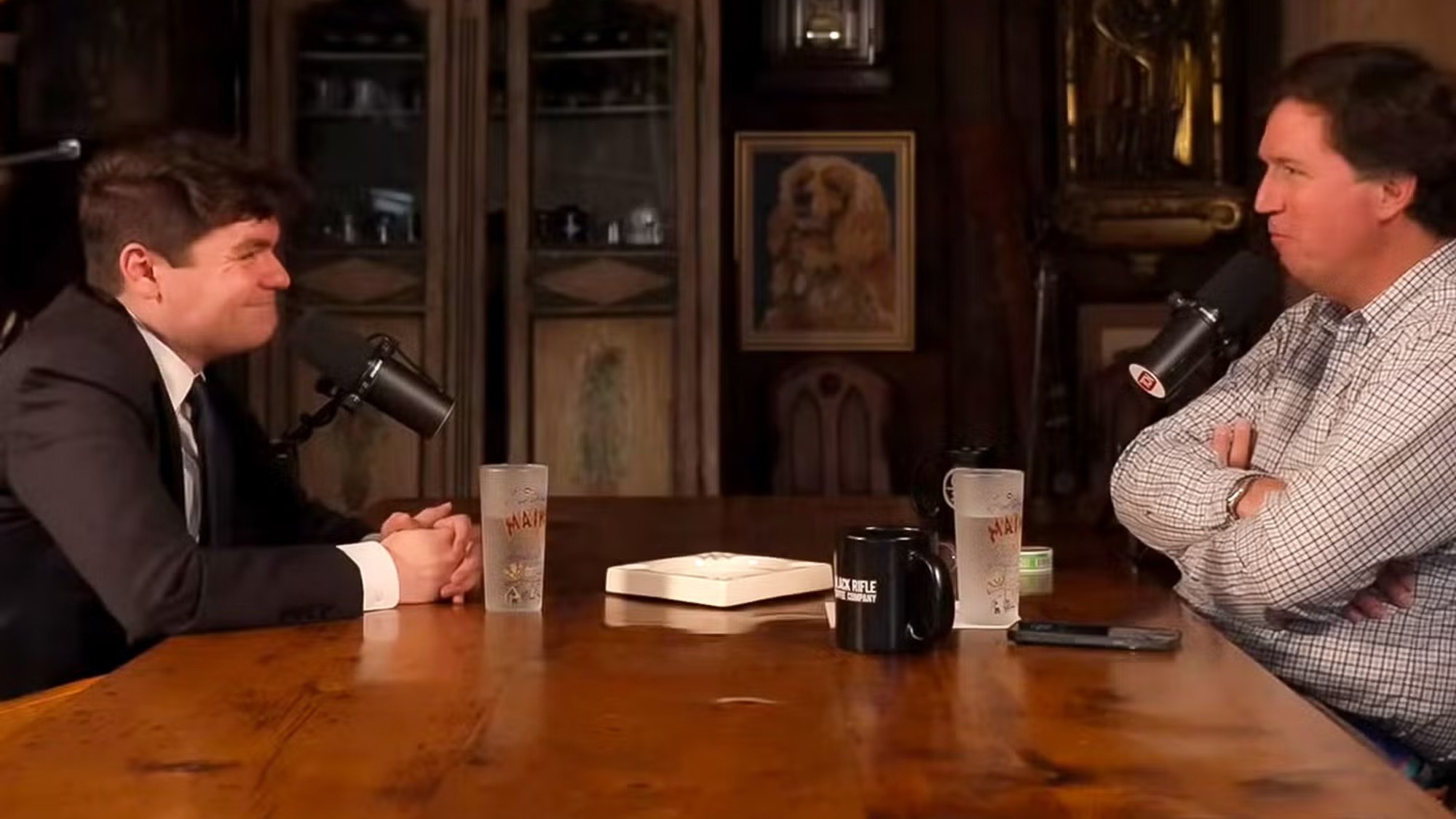Fox News' Tucker Carlson is right: Governments kill people
Yes, even the U.S. government


A free daily email with the biggest news stories of the day – and the best features from TheWeek.com
You are now subscribed
Your newsletter sign-up was successful
Calling in to his network after he tagged along to North Korea with President Trump on Sunday, Fox News host Tucker Carlson mounted a scandalizing defense of this administration's engagement with Pyongyang.
"Yeah, I mean, there's no defending the North Korean regime," Carlson began, declaring leader Kim Jong Un's government "monstrous," "disgusting," and "the last really Stalinist regime in the world." But the Fox pundit didn't stop there. "On the other hand, you know, you've got to be honest about what it means to lead a country,” he said:
It means killing people. Not on the scale that the North Koreans do, but a lot of countries commit atrocities, including a number we're closely allied with. It's important to be honest about that, and it's not necessarily a choice between, you know, the evil people and the great people. It's a choice, most of the time, between the bad people and the worst people. That's kind of the nature of life, certainly the nature of power, and I do think that's how the president sees it. [Tucker Carlson]
Carlson's bloody realpolitik drew broad indignation. "Tucker Carlson thinks leading a country means you have to kill people," gasped progressive blog Crooks and Liars in a representative post, labeling the line "a despicable excuse for the literal murder of citizens." Charlie Sykes of never-Trump conservative site The Bulwark offered a similar review, sarcastically tweeting that "Tucker Carlson's endorsement of mass murder" is the "highlight" of the "Trumpist media's pivot on appeasement." On Reddit's politics forum, highly rated comments suggsted Carlson's intent was to "normalize it for Trump to start doing this" — "it" apparently referring to "killing people" — and persuade Fox viewers "to think that having a despotic dictator would be perfectly normal."
The Week
Escape your echo chamber. Get the facts behind the news, plus analysis from multiple perspectives.

Sign up for The Week's Free Newsletters
From our morning news briefing to a weekly Good News Newsletter, get the best of The Week delivered directly to your inbox.
From our morning news briefing to a weekly Good News Newsletter, get the best of The Week delivered directly to your inbox.
Carlson deserves every bit of condemnation he's received insofar as he minimized the Kim regime's hideous violence. (Incidentally, downplaying North Korea's horrors will only undercut the vital case for diplomatic engagement as a route away from war.) Yet in a more general sense, Carlson isn't wrong: Governments do kill people. Outside of tiny, progressive, wealthy nations mostly concentrated in Western Europe in the last eight decades, leading a country does mean killing people. Indeed, possession of a monopoly on the legitimate use of violence is considered a definitional characteristic of the modern state. Governments exist, significantly, to kill people.
This is not only true about "a lot of countries ... including a number that we are closely allied with" — though certainly Saudi Arabia, Washington's child-executing, journalist-dismembering, war-crimes-committing buddy in the Middle East, verifies that claim all by itself. Carlson's line is also true about our own government.
Take off the rosy glasses of nationalist patriotism and this is evident. Our military has been engaged in armed conflict of varying scale almost constantly throughout our history. At present, we are fighting at least five wars — Afghanistan, Iraq, Somalia, Syria, and Yemen — depending on how you count them. Our government launches drone strikes on weddings. It helps Saudi forces take out school buses full of kids. Leading this country "means killing people." Do we imagine any American president has hands clean of blood?
Perhaps you think Carlson's comment was narrower in scope, applying only to Kim's domestic killing. Our government has done that, too. Think of the Trail of Tears, the de facto state endorsement of public lynching in the Jim Crow era, the Tuskegee syphilis experiment, or the MOVE bombing in Philly, to name a few examples. Remember that half of our states still employ the death penalty, and that extrajudicial police killings have been a major feature of our national debate in the past five years. This is not the same, of course, as North Korea's all-encompassing system of brainwashing, torture, and genocide. Still, historically and in the United States today, government kills people. Our government kills people.
A free daily email with the biggest news stories of the day – and the best features from TheWeek.com
Carlson is wickedly wrong that it is "silly" to deplore North Korea's atrocities. But pearl-clutching over public acknowledgement of the reality of state violence is disingenuous for any but the ignorant. A more honest — and useful — response would take three related forms.
First, the truth that government kills people is central to why government must be limited. "On the opening day of law school," wrote Yale law professor Stephen L. Carter at Bloomberg in 2014, "I always counsel my first-year students never to support a law they are not willing to kill to enforce. Usually they greet this advice with something between skepticism and puzzlement, until I remind them that the police go armed to enforce the will of the state, and if you resist, they might kill you." Carter was reflecting on the death of Eric Garner at the hands of New York City police, but his point is more widely applicable. The state metes out violence, including lethal violence, and it will kill fewer people if we permit it fewer reasons to kill.
Second, we should limit our government's violence in foreign policy, both its waging of aggressive and avoidable wars and its entanglement with murderous foreign regimes. This is not a proposal of isolationism or naivete; as I wrote in regards to Saudi Arabia last year, I have no illusions that the United States will only deal with "nice" nations that love liberty, justice, and democracy. Diplomatic and economic engagement can help normalize, pacify, and free such countries. But there is a difference between talking and trading and maintaining a close partnership (including arms sales) with states we know habitually murder at home and abroad.
Finally, we must limit what we personally will do at our government's behest. As a Christian who believes commitment to nonviolence is integral to following Jesus, for me that rules out quite a lot of participation in government. I could not join the military or become a police officer. I would not run for office above the local level, if at all. With the early theologian Tertullian, I cannot justify "mak[ing] an occupation of the sword," and the state is defined by its use of the sword.
You may not draw the same line. But governments do kill people, so you must draw a line somewhere.
Bonnie Kristian was a deputy editor and acting editor-in-chief of TheWeek.com. She is a columnist at Christianity Today and author of Untrustworthy: The Knowledge Crisis Breaking Our Brains, Polluting Our Politics, and Corrupting Christian Community (forthcoming 2022) and A Flexible Faith: Rethinking What It Means to Follow Jesus Today (2018). Her writing has also appeared at Time Magazine, CNN, USA Today, Newsweek, the Los Angeles Times, and The American Conservative, among other outlets.
-
 The ‘ravenous’ demand for Cornish minerals
The ‘ravenous’ demand for Cornish mineralsUnder the Radar Growing need for critical minerals to power tech has intensified ‘appetite’ for lithium, which could be a ‘huge boon’ for local economy
-
 Why are election experts taking Trump’s midterm threats seriously?
Why are election experts taking Trump’s midterm threats seriously?IN THE SPOTLIGHT As the president muses about polling place deployments and a centralized electoral system aimed at one-party control, lawmakers are taking this administration at its word
-
 ‘Restaurateurs have become millionaires’
‘Restaurateurs have become millionaires’Instant Opinion Opinion, comment and editorials of the day
-
 The billionaires’ wealth tax: a catastrophe for California?
The billionaires’ wealth tax: a catastrophe for California?Talking Point Peter Thiel and Larry Page preparing to change state residency
-
 Bari Weiss’ ‘60 Minutes’ scandal is about more than one report
Bari Weiss’ ‘60 Minutes’ scandal is about more than one reportIN THE SPOTLIGHT By blocking an approved segment on a controversial prison holding US deportees in El Salvador, the editor-in-chief of CBS News has become the main story
-
 American antisemitism
American antisemitismFeature The world’s oldest hatred is on the rise in U.S. Why?
-
 The GOP: Will it welcome antisemites?
The GOP: Will it welcome antisemites?Feature That Carlson would grant Fuentes access to his massive audience is proof that his hate ‘is entering the MAGA mainstream’
-
 Has Zohran Mamdani shown the Democrats how to win again?
Has Zohran Mamdani shown the Democrats how to win again?Today’s Big Question New York City mayoral election touted as victory for left-wing populists but moderate centrist wins elsewhere present more complex path for Democratic Party
-
 Nick Fuentes’ Groyper antisemitism is splitting the right
Nick Fuentes’ Groyper antisemitism is splitting the rightTalking Points Interview with Tucker Carlson draws conservative backlash
-
 Millions turn out for anti-Trump ‘No Kings’ rallies
Millions turn out for anti-Trump ‘No Kings’ ralliesSpeed Read An estimated 7 million people participated, 2 million more than at the first ‘No Kings’ protest in June
-
 Ghislaine Maxwell: angling for a Trump pardon
Ghislaine Maxwell: angling for a Trump pardonTalking Point Convicted sex trafficker's testimony could shed new light on president's links to Jeffrey Epstein
